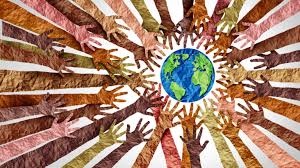
Embracing Cultural Diversity: Building Bridges in a Global Society
The Importance of Cultural Sensitivity in a Diverse Society
In today’s interconnected world, cultural sensitivity plays a crucial role in fostering understanding and harmony among diverse communities. It is essential to recognize and respect the beliefs, traditions, and practices of different cultures to build inclusive societies where everyone feels valued and accepted.
Cultural sensitivity involves being aware of one’s own cultural background while also being open to learning about and appreciating the cultures of others. By embracing diversity and practicing empathy, individuals can bridge cultural gaps and form meaningful connections with people from various backgrounds.
One key aspect of cultural sensitivity is effective communication. Understanding the nuances of language, non-verbal cues, and social norms specific to different cultures can prevent misunderstandings and promote positive interactions. By listening actively and showing respect for diverse perspectives, individuals can create an environment of mutual respect and collaboration.
Furthermore, cultural sensitivity fosters a sense of belonging and inclusivity within communities. When individuals feel that their culture is acknowledged and respected, they are more likely to engage actively in society and contribute positively to its growth. This sense of belonging strengthens social cohesion and promotes unity amid diversity.
Education plays a vital role in promoting cultural sensitivity from an early age. By incorporating multicultural perspectives into curricula and promoting intercultural dialogue in schools, young people can develop empathy, tolerance, and respect for diversity. These values lay the foundation for a more inclusive society where differences are celebrated rather than feared.
In conclusion, cultural sensitivity is a cornerstone of building harmonious relationships in a diverse society. By valuing each other’s unique backgrounds and experiences, individuals can create a more compassionate world where everyone has the opportunity to thrive. Embracing cultural diversity enriches our lives by broadening our perspectives and deepening our connections with others.
6 Essential Tips for Navigating and Embracing New Cultures
- Respect local customs and traditions when visiting a new culture.
- Be open-minded and willing to learn about different cultural practices.
- Avoid making assumptions or judgments based on stereotypes.
- Engage with locals to gain a deeper understanding of their culture.
- Try traditional foods and participate in cultural activities to immerse yourself in the experience.
- Remember that what is considered appropriate behavior may vary across cultures.
Respect local customs and traditions when visiting a new culture.
When visiting a new culture, it is essential to respect local customs and traditions. By honoring the practices and beliefs of the community you are entering, you show appreciation for their heritage and values. This gesture not only demonstrates cultural sensitivity but also fosters positive interactions and mutual understanding. Embracing local customs allows you to immerse yourself more fully in the culture, creating meaningful experiences and building respectful relationships with the people you meet.
Be open-minded and willing to learn about different cultural practices.
To foster cultural sensitivity, it is essential to be open-minded and willing to learn about different cultural practices. By approaching unfamiliar customs and traditions with curiosity rather than judgment, individuals can broaden their understanding of diverse cultures and appreciate the richness they bring to our global community. Embracing a mindset of openness and receptivity allows for meaningful cross-cultural exchanges and deepens connections with people from all walks of life.
Avoid making assumptions or judgments based on stereotypes.
It is essential to avoid making assumptions or judgments based on stereotypes when engaging with different cultures. Stereotypes often oversimplify and distort the complexities of a culture, leading to misunderstandings and perpetuating harmful biases. By approaching each individual with an open mind and a willingness to learn about their unique background and experiences, we can foster genuine connections and mutual respect. Embracing cultural diversity requires us to challenge preconceived notions and appreciate the richness of each person’s heritage without reducing them to inaccurate generalizations.
Engage with locals to gain a deeper understanding of their culture.
Engaging with locals is a valuable tip for gaining a deeper understanding of their culture. By interacting with people who belong to a particular culture, individuals can immerse themselves in the traditions, customs, and daily life practices that shape that community. Through meaningful conversations, shared experiences, and observing local rituals, one can develop a more profound appreciation for the nuances and richness of a culture that goes beyond surface-level observations. Building connections with locals not only fosters cultural sensitivity but also creates opportunities for authentic cultural exchange and mutual learning.
Try traditional foods and participate in cultural activities to immerse yourself in the experience.
To truly immerse yourself in a cultural experience, consider trying traditional foods and participating in cultural activities. Sampling local dishes allows you to savor the flavors and ingredients that are integral to a culture’s culinary heritage. Additionally, engaging in cultural activities such as festivals, dances, or rituals provides insight into the traditions and values that shape a community’s identity. By actively participating in these aspects of culture, you can gain a deeper appreciation for the richness and diversity of the world around you.
Remember that what is considered appropriate behavior may vary across cultures.
It is important to remember that what is considered appropriate behavior can vary significantly across different cultures. What may be acceptable or even expected in one culture could be perceived as inappropriate or disrespectful in another. Being mindful of these cultural differences helps to navigate social interactions with sensitivity and respect, fostering understanding and harmonious relationships across diverse communities.


